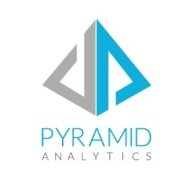

Teradata and Pyramid Analytics compete in the data management and analytics market, with Teradata offering strong performance for large-scale environments and Pyramid known for user-friendly self-service features. Teradata leads in handling large data volumes efficiently, while Pyramid stands out for cost-effectiveness and ease of use.
Features: Teradata's key strengths include massively parallel processing, a shared-nothing architecture, and strong workload management, which contribute to its high speed and scalability. Security features add another layer of reliability. Pyramid Analytics excels in self-service capabilities and supports complex DAX queries, catering specifically to financial analysis and reporting needs. It also provides extensive drill-down options, enhancing user engagement.
Room for Improvement: Teradata could enhance its user-friendliness in setup and maintenance and lower costs related to pricing and scalability. Improvements in cloud offerings are also needed. Pyramid Analytics would benefit from better user guidance resources, improved data lineage documentation, system stability enhancements, and more advanced visualization options.
Ease of Deployment and Customer Service: Teradata provides flexibility with deployment options such as on-premises, private cloud, and hybrid setups, though considered complex by some users. Customer service is mixed, with varying response times. Pyramid Analytics is noted for its simpler deployment and receives high ratings for customer support, despite some dissatisfaction regarding technical assistance.
Pricing and ROI: Teradata is perceived as high-priced but offers a strong ROI, especially for large-scale deployments, yet may be costly for smaller projects due to complexity. Pyramid Analytics is seen as more cost-effective, suitable for larger organizations seeking comprehensive features without hefty financial commitments.
There is a positive return on the data investment for my clients using Pyramid Analytics.
At least fifteen to twenty percent of our time has been saved using Teradata, which has positively affected team productivity and business outcomes.
Independent research showed that Teradata VantageCloud users achieved an average ROI of 427% across three years with payback under a year, demonstrating the platform's ability to deliver a strong financial return.
We have realized a return on investment, with a reduction of staff from 27 to eight, and our current return on investment is approximately 14%.
The one time we had an issue related to something with the logins, they addressed it that morning.
The customer support for Teradata has been great.
They are responsive and knowledgeable, and the documentation is very helpful.
Customer support is very good, rated eight out of ten under our essential agreement.
Regarding Pyramid Analytics' scalability from what I have seen, with the right people managing it, it can handle growing amounts of data and users well.
Whenever we need more resources, we can add that in Teradata, and when not needed, we can scale it down as well.
This flexibility allows organizations to scale according to their needs, balancing performance, cost, and compliance requirements.
This expansion can occur without incurring downtime or taking systems offline.
Pyramid Analytics is stable in my experience; there have not really been issues with downtime or bugs.
Its massively parallel process architecture allows the platform to distribute workload efficiently, enabling organizations to run heavy analytic queries without compromising speed or stability.
I find the stability to be almost a ten out of ten.
The workload management and software maturity provide a reliable system.
Any advanced user wants to implement an idea that they have, and while the whole idea of a platform is not necessarily to give a custom solution, I would not mind if they had more in terms of AutoML or that sort of capability.
I want to highlight two features for improvement: first, storing data in various formats without requiring a tabular structure, accommodating unstructured data; and second, adding AI ML features to better integrate Gen AI, LLM concepts, and user-friendly experiences such as text-to-SQL capabilities.
Unlike SQL and Oracle, which have in-built replication capabilities, we don't have similar functionality with Teradata.
The most challenging aspect is finding Teradata resources, so we are focusing on internal training and looking for more Teradata experts.
Teradata is much more expensive than SQL, which is well-performed and cheaper.
Initially, it may seem expensive compared to similar cloud databases, however, it offers significant value in performance, stability, and overall output once in use.
Role-based access control (RBAC), strong audit and compliance features, high availability, fault tolerance, and encrypted data at rest and in-transit are key features.
After implementing Pyramid Analytics for my clients, I have seen measurable outcomes and specific improvements, such as having a single platform that gets them from the raw data to the endpoint reporting.
Teradata's security helps our organization meet compliance requirements such as GDPR and IFRS, and it is particularly essential for revenue contracting or revenue recognition.
Its architecture allows information to be processed efficiently while maintaining stable performance, even in highly demanding environments.
It facilitates data integration, where we integrate and analyze data from various sources, making it a powerful and high-quality reliable solution for the company.
| Product | Market Share (%) |
|---|---|
| Teradata | 0.9% |
| Pyramid Analytics | 1.0% |
| Other | 98.1% |


| Company Size | Count |
|---|---|
| Small Business | 7 |
| Midsize Enterprise | 1 |
| Large Enterprise | 1 |
| Company Size | Count |
|---|---|
| Small Business | 28 |
| Midsize Enterprise | 13 |
| Large Enterprise | 52 |
The BI Office from Pyramid Analytics is a web-based governed data discovery and analytics platform. It integrates the four principal functions of any comprehensive BI strategy into a single, seamless application. Users can now analyze, present, report and predict on their data in a single application. Pyramid Analytics has native apps to cover the entire mobile spectrum, iOS, Android and Windows. With BI Office users can integrate SAP data with data from other sources giving them the right tools and better data to make data-driven decisions.
Teradata is a powerful tool for handling substantial data volumes with its parallel processing architecture, supporting both cloud and on-premise environments efficiently. It offers impressive capabilities for fast query processing, data integration, and real-time reporting, making it suitable for diverse industrial applications.
Known for its robust parallel processing capabilities, Teradata effectively manages large datasets and provides adaptable deployment across cloud and on-premise setups. It enhances performance and scalability with features like advanced query tuning, workload management, and strong security. Users appreciate its ease of use and automation features which support real-time data reporting. The optimizer and intelligent partitioning help improve query speed and efficiency, while multi-temperature data management optimizes data handling.
What are the key features of Teradata?
What benefits and ROI do users look for?
In the finance, retail, and government sectors, Teradata is employed for data warehousing, business intelligence, and analytical processing. It handles vast datasets for activities like customer behavior modeling and enterprise data integration. Supporting efficient reporting and analytics, Teradata enhances data storage and processing, whether deployed on-premise or on cloud platforms.
We monitor all BI (Business Intelligence) Tools reviews to prevent fraudulent reviews and keep review quality high. We do not post reviews by company employees or direct competitors. We validate each review for authenticity via cross-reference with LinkedIn, and personal follow-up with the reviewer when necessary.